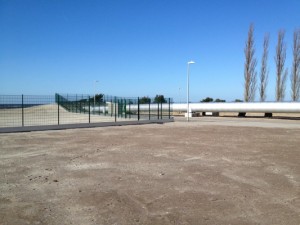
Europe Should Embargo Imports of Russian Natural Gas
The situation between Russia and Ukraine is rapidly spinning out of control. We see Russian troops occupying the Crimea, and the interim Ukrainian Prime Minister saying: “This is actually a declaration of war to my country” and has mobilized the Ukrainian military reserves. Putin, meanwhile, says that Russia “reserves the right to use all means at our disposal” to protect Russians – seemingly a blank check.
What leverage does the United States and its allies in Europe have over Russia? Energy was central to the causes of the conflict, and it could prove to provide a solution.
The last two international crises between Ukraine and Russia (in 2006 and 2009) were over fees that Ukraine paid to Russia for supplies of natural gas and transshipment fees for sending it along to Europe. Natural gas was also a precursor for this crisis; a large part of the aid package given by Putin’s government to the Yanukovich government that sparked protests in November was for reduced rates of natural gas. A look at the maps of pipelines from Russia to Europe shows how they all enter from East and North from Russia and exit through to the EU in the West.
In the last five years, the U.S. has undergone a boom in energy production. Europe, on the other hand, has gone through a prolonged euro crisis, and some are pointing to its energy prices as making it uncompetitive with a U.S. that is benefitting from the shale gas boom. It is ironic, then, that Europe, with few domestic energy resources, holds a trump card.
For more than 40 years, U.S. policymakers have worried that the network of oil and gas pipelines stretching from East to West were creating a dependence on first the U.S.S.R. and then Russia that would allow the Russian government to exert political pressure on European governments: they could threaten to cut-off supplies, it was thought, and the European governments would fold. What we overlooked is that energy dependence goes both ways. Russian firms and the Russian federal budget are even more dependent on Europeans to buy their gas than European countries are to receive it. It is time for Europe to play that trump card.
On Sunday, the G7 made a strong statement condemning Russia’s “clear violation of the sovereignty and territorial integrity of Ukraine.” The European members of the G7 can add teeth to this statement by embargoing the importation of any natural gas from Russia that is not transshipped through Ukraine. Such a statement would show solidarity with Ukraine by stopping gas imports while also giving Ukraine’s strapped budget the transshipment fees it needs.
The European G7 members of Germany, France, Italy, and the UK have a diverse and redundant energy system that could operate without imports of natural gas from Russia. Stepped-up Liquefied Natural Gas (LNG) imports from Norway and from the Middle East, plus other energy exports from the U.S., combined with fuel substitution (coal and renewables), along with reduced seasonal demand from warmer spring temperatures mean that this embargo could be enforced without substantial harm to European economies.
Germany would be the key country in an embargo. The Nord Stream pipeline stretches more than 750 miles under the Baltic Sea from Vyborg, Russia to Griefswald, Germany. Its twin pipes can provide about 2 trillion cubic feet of gas per year (around 10% of EU demand). From its start, seemingly the only reason for the extra expense to lay it under the Baltic was to avoid transit countries like Ukraine, Lithuania, or Poland.
With the announcement of an embargo, the German government could immediately cut off imports through the Nord Stream, immediately denying Gazprom and the Russian government a very significant source of hard currency. Germany has an opportunity here to punish Russia’s bad behavior by turning off the Nord Stream’s tap.
Russia has overstepped its bounds by invading Ukraine. One of its largest sources of income is from energy exports and production. The G7 can immediately add teeth to its statement of condemnation by announcing that it would not buy Russian natural gas – while also keeping solidarity with Ukraine by announcing that any gas passing through Ukraine would be exempt.
The U.S. should support this statement by announce support for NATO allies. The U.S. could providing energy exports to make up for the Russian shortfalls (though we could not export the natural gas without yet-to-be-build infrastructure). Russia should learn that the politics of energy insecurity goes both ways: it is not just importers that are threatened. Energy suppliers, too, cannot simply flout international norms by invading neighboring countries.






